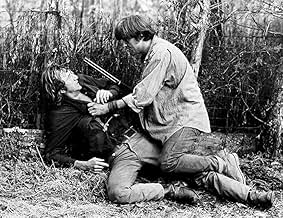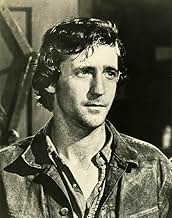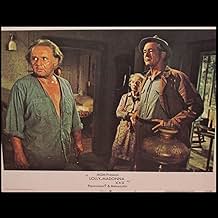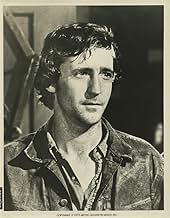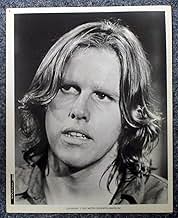IMDb RATING
6.4/10
944
YOUR RATING
In the early 1970s, a young woman passing through rural Tennessee unintentionally gets caught in a feud between two local neighboring clans, the Feathers and the Gutshalls.In the early 1970s, a young woman passing through rural Tennessee unintentionally gets caught in a feud between two local neighboring clans, the Feathers and the Gutshalls.In the early 1970s, a young woman passing through rural Tennessee unintentionally gets caught in a feud between two local neighboring clans, the Feathers and the Gutshalls.
Kathy Watts
- Lyda Jo Gutshall Feather
- (uncredited)
Featured reviews
I saw this movie on TCM late at night (must be around 2 AM) when I was channel surfing. I was actually intrigued by its title and decided to watch it assuming it was a campy 70's sex romp. But once you see established names like Rod Steiger, Robert Ryan, Jeff Bridges, Randy Quaid, Scott Wilson, Ed Lauter and Gary Busey, you know you are wrong.
Though not everybody's cup of tea, Lolly Madonna XXX is a surprise treat - one of those movies that surprise you just when you think you know whats going to happen next or assume nothings going to happen at all. With terrific performances especially by Ed Lauter, a(very thin looking)Randy Quaid and a very young Jeff Bridges besides a beautiful score thats just right,this is a movie you shouldn't miss.
Though not everybody's cup of tea, Lolly Madonna XXX is a surprise treat - one of those movies that surprise you just when you think you know whats going to happen next or assume nothings going to happen at all. With terrific performances especially by Ed Lauter, a(very thin looking)Randy Quaid and a very young Jeff Bridges besides a beautiful score thats just right,this is a movie you shouldn't miss.
This viewer had been wanting to see this little movie for years. Not only does it have a strong cast of veterans and then up-and-coming young stars, but it sounded like fun. He expected something trashy and action-driven, but ended up getting something more. This is really a pretty thoughtful melodrama with very convincing rustic atmosphere and efficient direction by Richard C. Sarafian (of "Vanishing Point" fame).
Rod Steiger and Robert Ryan (the latter in one of his final film roles) play Laban and Pap, the patriarchs of the Feather and Gutshall families. These families used to be close, but eventually things got bad, real bad. The Hatfields and McCoys type feud starts out somewhat mild, with pranks being pulled. The title comes from a phony postcard, signed by a made-up woman, "Lolly-Madonna", designed to get one family to abandon their still. This leads the Feathers to kidnap a young traveller (Season Hubley) who they are convinced must be this "Lolly- Madonna".
It's interesting to note that this was an early credit for the famed author Sue Grafton, who also wrote the screenplay with producer Rodney Carr-Smith. It's a very serious meditation on the utter futility and madness of any war, especially the Vietnam war. The material gives some juicy acting opportunities to a superb ensemble. Steiger and Ryan mostly play it low key (although Steiger *does* eventually erupt into typical Steiger-esque acting) in order to let the younger generation make their mark. And what a supporting cast: Jeff Bridges, Scott Wilson, Timothy Scott, Kiel Martin, Ed Lauter, Randy Quaid, Gary Busey, Paul Koslo. Lauter is especially fun as Hawk, who has fantasies of being an Elvis-like rock star. Bridges plays Labans' son Zack, and as he and Hubley make a connection, you realize that they're the biggest hope for some semblance of sanity and reason in this story. Still, it's hard to deny the somber feeling of inevitability to everything here.
The rough, grainy look is actually appropriate for the mood, and Fred Myrow contributes a very affecting music score.
This is an intriguing, now somewhat obscure, movie deserving of another look.
Eight out of 10.
Rod Steiger and Robert Ryan (the latter in one of his final film roles) play Laban and Pap, the patriarchs of the Feather and Gutshall families. These families used to be close, but eventually things got bad, real bad. The Hatfields and McCoys type feud starts out somewhat mild, with pranks being pulled. The title comes from a phony postcard, signed by a made-up woman, "Lolly-Madonna", designed to get one family to abandon their still. This leads the Feathers to kidnap a young traveller (Season Hubley) who they are convinced must be this "Lolly- Madonna".
It's interesting to note that this was an early credit for the famed author Sue Grafton, who also wrote the screenplay with producer Rodney Carr-Smith. It's a very serious meditation on the utter futility and madness of any war, especially the Vietnam war. The material gives some juicy acting opportunities to a superb ensemble. Steiger and Ryan mostly play it low key (although Steiger *does* eventually erupt into typical Steiger-esque acting) in order to let the younger generation make their mark. And what a supporting cast: Jeff Bridges, Scott Wilson, Timothy Scott, Kiel Martin, Ed Lauter, Randy Quaid, Gary Busey, Paul Koslo. Lauter is especially fun as Hawk, who has fantasies of being an Elvis-like rock star. Bridges plays Labans' son Zack, and as he and Hubley make a connection, you realize that they're the biggest hope for some semblance of sanity and reason in this story. Still, it's hard to deny the somber feeling of inevitability to everything here.
The rough, grainy look is actually appropriate for the mood, and Fred Myrow contributes a very affecting music score.
This is an intriguing, now somewhat obscure, movie deserving of another look.
Eight out of 10.
I too saw Lolly Madonna XXX very late one night 20 years ago. I am now 41 years old and still haunted by this film. When I saw this movie at 21 years of age, I was very disturbed by it - the way these families lived, the misunderstanding and violence between the families, the misunderstanding and violence within each family itself -it was overwhelming. However, to this day, I consider this to be the best film I have ever seen. I judge a movie based on the ability it has to make me really FEEL - and Lolly Madonna did that for me like no other film ever has!! This film forces you to become attached to each and every character. And then when things start to go very, very, wrong.............well, I can't say anymore. Suffice it to say that this film will seriously affect anyone thinking person who sees it. There is also a very sad but very beautiful about the music. When I saw it the first time I couldn't stop thinking about for two days! I was fortunate enough to have caught this a second time about 15 years ago on the late, late movie (from the beginning) and was able to video tape it. Unfortunately, the tape was misplaced in my move to NYC. I would pay good, good money to own this movie!! That is, if I could find it!!
This one starts out like the distant inbred cousin of Deliverance from West Virginia come out on the porch to play the banjo. A menacing beat-up flatbet truck runs circles around a girl killing time in a remote bus stop on her way to Nashville. There's promise of backwoods squalor and meanness and the delivery of it, not exploitation graphic and gratuitous but it's there, the passerby girl is snatched, another girl is raped, a moonshine still is busted, and a backwoods yokel with painted eyes and a bra makes a scene. At that point the Feathers family appears to be only a few generations of inbreeding away from moving down to Texas to make lampshades out of human skin and chase Marilyn Burns with a buzzing chainsaw.
Then, as the two feuding families headed by patriarchs Rod Steiger and Robert Ryan begin to spar about stolen hogs and a postcard written to one Lolly-Madonna and a grassy meadow that at one time belonged to one or the other family, something begins to change like a dark cloud passes over the movie. It's not about the futile anguish and madness of vendetta, although it seems so at first. And it's not about hogs or the grassy meadow or even land as a basic abstraction and what it's come to signify for people who had nothing to call their own for generations but land. It's about the creeping realization of a broken life muttering to itself late at night on a rocking chair by the window that "it's too late", that it's too late not for killing and dying but for even words.
It's about something that happened long ago which can't be made right again, and it has something to do with a son who never came back from the war, about brothers who can never measure up to that son who never came back from the war because they stayed behind, about a dead wife who was more important to the father-in-law than the son who lost her, that much more important that the father-in-law had to sacrifice that which was the most important thing in the life of the other son (the one who never amounted much for anything) to repudiate the killing. And about horses. It's about bitter regret pain and anguish gnawing at the insides and then the grassy meadow is set on fire and the two families meet for a standoff outside the old rundown Feathers home, once probably elegant with wealth happiness and good fortune.
In the end, the look on Rod Steiger's eyes turns from anger and sadness to complete madness and Sarafian gives us freeze frames of the main characters that look like portraits of despair, the colors are drained out and the movie turns sepia yellowish as if in memory of something lost, of that small insubstantial detail that involved horses and the dead wife that was the result not of practical design or coincidence but of the pure blind chance of the cointoss that forever changed the lives of two families. Immense sadness. Or like William Faulkner would say, between grief and nothing, Lolly-Madonna XXX will choose grief.
Then, as the two feuding families headed by patriarchs Rod Steiger and Robert Ryan begin to spar about stolen hogs and a postcard written to one Lolly-Madonna and a grassy meadow that at one time belonged to one or the other family, something begins to change like a dark cloud passes over the movie. It's not about the futile anguish and madness of vendetta, although it seems so at first. And it's not about hogs or the grassy meadow or even land as a basic abstraction and what it's come to signify for people who had nothing to call their own for generations but land. It's about the creeping realization of a broken life muttering to itself late at night on a rocking chair by the window that "it's too late", that it's too late not for killing and dying but for even words.
It's about something that happened long ago which can't be made right again, and it has something to do with a son who never came back from the war, about brothers who can never measure up to that son who never came back from the war because they stayed behind, about a dead wife who was more important to the father-in-law than the son who lost her, that much more important that the father-in-law had to sacrifice that which was the most important thing in the life of the other son (the one who never amounted much for anything) to repudiate the killing. And about horses. It's about bitter regret pain and anguish gnawing at the insides and then the grassy meadow is set on fire and the two families meet for a standoff outside the old rundown Feathers home, once probably elegant with wealth happiness and good fortune.
In the end, the look on Rod Steiger's eyes turns from anger and sadness to complete madness and Sarafian gives us freeze frames of the main characters that look like portraits of despair, the colors are drained out and the movie turns sepia yellowish as if in memory of something lost, of that small insubstantial detail that involved horses and the dead wife that was the result not of practical design or coincidence but of the pure blind chance of the cointoss that forever changed the lives of two families. Immense sadness. Or like William Faulkner would say, between grief and nothing, Lolly-Madonna XXX will choose grief.
Not a film for all tastes. It's violent, almost nihilistic in outcome, and certainly not a classic Hollywood ending. Like some other reviewers, I take the narrative to be an allegory on war, at least of certain types of war. Here a dispute over a lovely Tennessee meadow escalates tragically into a shooting war between two patriarchal families that devastates both clans. Tragically, neither patriarch (Steiger nor Ryan) exercises the kind of leadership to head off the calamitous results. Thus headstrong elements are allowed to operate at gut level instead of anything reasoned, producing tragic results.
Frankly, I'm not sure whether I liked the film or not. Parts are compelling, especially the sensitive romance between Bridges and Hubley. Both are outstanding; in fact Hubley almost made me feel her painful confusion. Also, the beauty of the rolling hills and meadow contrasts creatively with the clans' destructive emotions. Then too, whose inspiration was balding Edd Lauter's secret fantasy to fly away on his tattooed wings to become the next southern Elvis, his chances about as good as mine. And judging from the dilapidated shacks, their time would be better spent fixing up where they dwell instead of taking each other down.
On the movie's downside is the choppy editing that at times makes the storyline hard to follow, especially when the scene shifts from one clan to the other. Thus the threads can at times be hard to follow. Moreover, except for the few romantic interludes, the mood is unrelentingly grim, not exactly an audience come-on. Anyway, Steiger is uncharacteristically restrained, while Ryan doesn't get the screen time his talent deserves. At the same time, a lot of younger talent does get a chance to shine.
All in all, I guess I respect the movie more than I liked it, its moral certainly meriting that kind of consideration.
Frankly, I'm not sure whether I liked the film or not. Parts are compelling, especially the sensitive romance between Bridges and Hubley. Both are outstanding; in fact Hubley almost made me feel her painful confusion. Also, the beauty of the rolling hills and meadow contrasts creatively with the clans' destructive emotions. Then too, whose inspiration was balding Edd Lauter's secret fantasy to fly away on his tattooed wings to become the next southern Elvis, his chances about as good as mine. And judging from the dilapidated shacks, their time would be better spent fixing up where they dwell instead of taking each other down.
On the movie's downside is the choppy editing that at times makes the storyline hard to follow, especially when the scene shifts from one clan to the other. Thus the threads can at times be hard to follow. Moreover, except for the few romantic interludes, the mood is unrelentingly grim, not exactly an audience come-on. Anyway, Steiger is uncharacteristically restrained, while Ryan doesn't get the screen time his talent deserves. At the same time, a lot of younger talent does get a chance to shine.
All in all, I guess I respect the movie more than I liked it, its moral certainly meriting that kind of consideration.
Did you know
- TriviaBased on the 1969 novel, "The Lolly Madonna War," by Sue Grafton, author of the popular "alphabet mysteries" featuring hard-boiled female Private Investigator Kinsey Millhone. The twelfth installment, "'L' is for Lawless," was published in the United States in 1995.
- Quotes
Sister E. Gutshall: [to Hawk's made-up face] Indian chief my foot! You look like a shitty little queer!
- Alternate versionsThe film originally received an "R" rating from the MPAA due to the violence, which was later trimmed to receive a "PG" rating. The details removed from the "R" version include a brief Season Hubley nude scene, and "toning down" of the violence, especially the scene in which "Laban" kicks "Thrush" to death. Most critics saw the "R" version.
- ConnectionsFeatured in The Moviemakers (1973)
- How long is Lolly-Madonna XXX?Powered by Alexa
Details
Contribute to this page
Suggest an edit or add missing content



